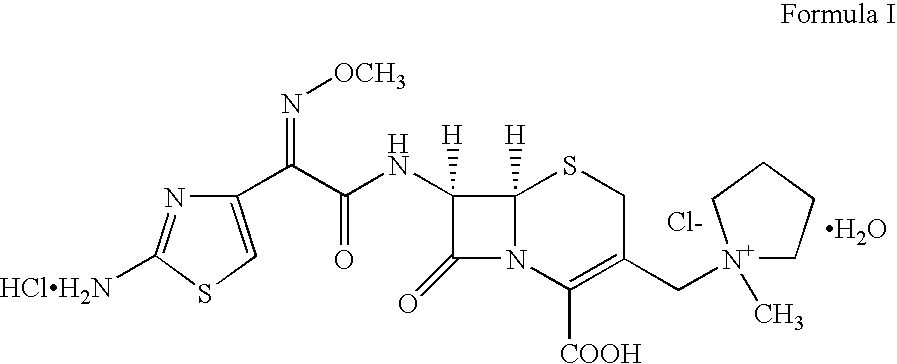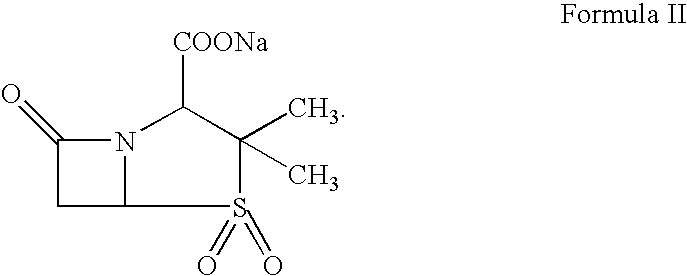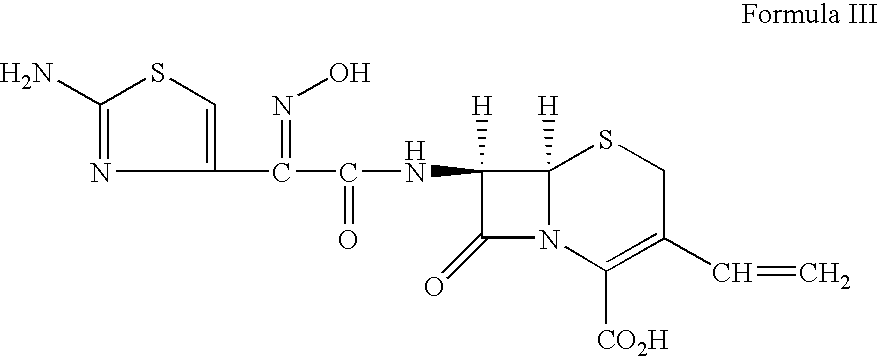Therapy for Treating Resistant Bacterial Infections
a technology for bacterial infections and antibiotics, applied in the field of improved therapy for treating resistant bacterial infections, can solve the problems of ineffective i>bacteroides fragilis /i>and i>clostridium difficil
- Summary
- Abstract
- Description
- Claims
- Application Information
AI Technical Summary
Benefits of technology
Problems solved by technology
Method used
Image
Examples
example 1
[0040]
TABLE 1Effect of sulbactam on Minimum Inhibitory Concentrations (MICs) ofcefepime against ESBL producing strains.Cefepime + SulbactamCefepimeMICs (μg / ml)StrainsSourceMICs (mcg / ml)248E. coli 1Metropolis1640.25E. coli 17Metropolis16410.06E. coli 215JRH16210.06E. coli 537JRH1620.250.06E. coli 548JRH1620.250.06Klebsiella 555JRH16410.06Klebsiella 524JRH16410.06Klebsiella 624JRH1640.5Klebsiella 583JRH16840.06
[0041]Procedure: MICs were determined as per NCCLS recommendations using Mueller Hinton Agar (MHA, Difco, USA). 20 ml of warm molten MHA containing serial two fold dilutions of cefepime with and without sulbactam was poured in to 90 mm diameter petridishes. Sulbactam at 2, 4 and 8 mcg / ml concentrations was added to various 2-fold concentrations of cefepime. The plates were allowed to solidify at room temperature. Bacterial strains were grown in TSB (Tryptic soya broth, Difco, USA) overnight and diluted to approximately to 107 CFU / ml. These culture dilutions were delivered on aga...
example 2
[0042]
TABLE 2Effect of increasing concentrations of cefepime with constantsulbactam concentration on enhancement of antibacterialaction against cefepime resistant E. coli 71 MP.Zone ofZone ofCefepimeinhibitionCefepime + sulbactaminhibitionmcg / disc(mm)(mcg / disc)(mm)0.5Nil0.5 + 5 101Nil1 + 5112Nil2 + 5124Nil4 + 5138Nil8 + 51416Nil16 + 5 15
[0043]Procedure: The experiment was performed by quantitative agar drug diffusion assay. 50 ml of fresh sterile molten Mueller Hinton Agar (MHA, Difco) was poured in sterile petri plate positioned on a leveled surface. Plates containing media were allowed to cool at 4° C. Bacterial inoculum was spread using sterile cotton swab, which was pre-dipped in a CFU (Colony forming units) adjusted bacterial suspension. The discs containing cefepime alone and cefepime with sulbactam were firmly placed on to culture seeded agar surface under sterile conditions. The plates were incubated at 37° C. for 24 h. The diameter of zones of inhibition was measured and r...
example 3
[0044]
TABLE 3Mutant Prevention Concentration (MPC) of cefepime with andwithout sulbactam using cefepime resistant E. coli 71 MPNo of coloniesNo of coloniesper agar plateper agar plateCefepimeCefepimeCefepime +Cefepime +Conc.alone4 mcg / ml of8 mcg / ml of(mcg / ml)Type of growthsulbactamsulbactam4Mat growth564928Mat growth130Nil16Mat growthNilNil
[0045]Procedure: Overnight grown cultures of cefepime resistant Gram-negative bacteria were brought to a log phase and concentrated in normal saline to a cell density of 5×109 CFU / ml by centrifugation. 150 μl of this suspension was spread in triplicate on to a large petri plates containing Mueller Hinton agar (MHA, Difco, USA). Plates were prepared with 4, 8, and 16 mcg / ml cefepime alone and each of these concentrations in combination with 4 and 8 mcg / ml of sulbactam. Plates were incubated at 37° C. for 48 hours and resistant colonies were enumerated.
PUM
| Property | Measurement | Unit |
|---|---|---|
| minimum inhibitory concentrations | aaaaa | aaaaa |
| minimum inhibitory concentrations | aaaaa | aaaaa |
| diameter | aaaaa | aaaaa |
Abstract
Description
Claims
Application Information
 Login to View More
Login to View More - R&D
- Intellectual Property
- Life Sciences
- Materials
- Tech Scout
- Unparalleled Data Quality
- Higher Quality Content
- 60% Fewer Hallucinations
Browse by: Latest US Patents, China's latest patents, Technical Efficacy Thesaurus, Application Domain, Technology Topic, Popular Technical Reports.
© 2025 PatSnap. All rights reserved.Legal|Privacy policy|Modern Slavery Act Transparency Statement|Sitemap|About US| Contact US: help@patsnap.com



